
The Doge's Palace is a palace built in Venetian Gothic style, and one of the main landmarks of the city of Venice in northern Italy. The palace was the residence of the Doge of Venice, the supreme authority of the former Venetian Republic. It was founded in 1340, and extended and modified in the following centuries. It became a museum in 1923, and is one of the 11 museums run by the Fondazione Musei Civici di Venezia.
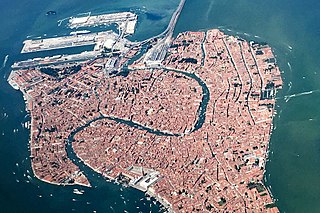
The Grand Canal is a channel in Venice, Italy. It forms one of the major water-traffic corridors in the city.
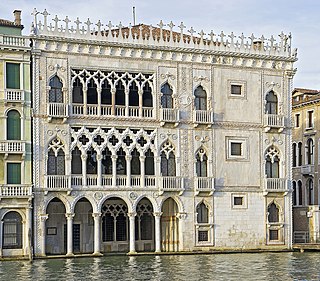
The Ca' d'Oro or Palazzo Santa Sofia is a palace on the Grand Canal in Venice, northern Italy. One of the older palaces in the city, its name means "golden house" due to the gilt and polychrome external decorations which once adorned its walls. Since 1927, it has been used as a museum, as the Galleria Giorgio Franchetti.

Santa Maria Formosa is a church in Venice, northern Italy. It was erected in 1492 under the design by Renaissance architect Mauro Codussi. It lies on the site of a former church dating from the 7th century, which, according to tradition, was one of the eight founded by San Magno, bishop of Oderzo. The name "formosa" relates to an alleged appearance of the Holy Virgin disguised as a voluptuous woman1.

Palazzo Malipiero is a palace in Venice, Italy. It is located on the Grand Canal in the central Campo San Samuele. It stands just across from Palazzo Grassi Exhibition Center. The adjacent Italian-style garden with a view on the Grand Canal, a rarity in Venice, makes it even more distinctive. Initially built in a Byzantine style, over the centuries it has undergone some modifications.

Ca' Vendramin Calergi is a palace on the Grand Canal in the sestiere (quarter) of Cannaregio in Venice, northern Italy. Other names by which it is known include: Palazzo Vendramin Calergi, Palazzo Loredan Vendramin Calergi, and Palazzo Loredan Griman Calergi Vendramin. The architecturally distinguished building was the home of many prominent people through history, and is remembered as the place where composer Richard Wagner died.

Pauly & C. – Compagnia Venezia Murano is a Venetian company that produces glass art, most notably Roman murrine, mosaics and chandeliers.

The Palazzo Giustinian is a palace in Venice, northern Italy, situated in the Dorsoduro district and overlooking the Grand Canal next to Ca' Foscari. It is among the best examples of the late Venetian Gothic and was the final residence of Princess Louise Marie Thérèse of France.

Palazzo Corner della Ca' Granda, also called Ca' Corner della Ca' Granda or simply Palazzo Corner or Palazzo Cornaro, is a Renaissance-style palace located between the Casina delle Rose and the Rio di San Maurizio (Venice), across the Grand Canal from the Palazzo Venier dei Leoni, in the city of Venice, Italy. It is the current seat of the province of Venice and of the city's prefect.

The Palazzo or Ca' Cappello Layard is a palace situated in the sestiere of San Polo of Venice, Italy, overlooking the Grand Canal at the confluence between this and the smaller Rio di San Polo and Rio delle Erbe. On the Grand canal, it is located between Palazzo Barbarigo della Terrazza and Palazzo Grimani Marcello. It is particularly noteworthy for having been the residence of Austen Henry Layard, discoverer of Niniveh.
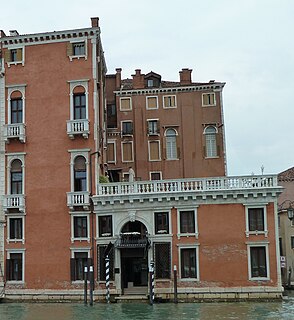
The Palazzo Barbarigo dalla Terrazza is a Renaissance-style palace on the Grand Canal, across the Rio San Polo from the Palazzo Cappello Layard and adjacent to the Palazzo Pisani Moretta in the sestiere of San Polo, in Venice, Italy. In 2015, it housed the Centro Tedesco di Studi Veneziani.

Palazzo Ariani, also known as Palazzo Ariani Minotto Cicogna, is a palace in Venice, located in the Dorsoduro district, almost opposite to the church of Angelo San Raffaele and not far from San Sebastiano. The nearby bridge Ponte del Soccorso connects it to the Palazzo Zenobio.

Palazzetto Tiepolo or Palazzo Soranzo Pisani is a palace in Venice, located in the San Polo district and overlooking the right side of the Grand Canal, between Palazzo Tiepolo and Palazzo Tiepolo Passi.

Palazzo Soranzo Cappello is a palace in Venice, Italy located in the Santa Croce district, near Palazzo Gradenigo. The palace is currently occupied by the Superintendence of Archaeology, the Fine Arts and Landscape for the metropolitan area of Venice and the provinces of Belluno, Padua and Treviso.

Palazzo Malipiero-Trevisan is a Renaissance palace in Venice, Italy located in the Castello district, on the south-eastern side of campo Santa Maria Formosa and separated from it by the Santa Maria Formosa river.

Palazzo Giustinian Pesaro is a Gothic palace located in Venice, Italy, in the Cannaregio district and overlooking the Grand Canal. The palazzo is situated between Ca' d'Oro and Palazzo Morosini Sagredo.

Palazzo Donà Balbi is a palace in Venice, Italy, located in the Santa Croce district, overlooking the right side of the Grand Canal on the Riva di Biasio foundation opposite Palazzo Flangini and the church of San Geremia.
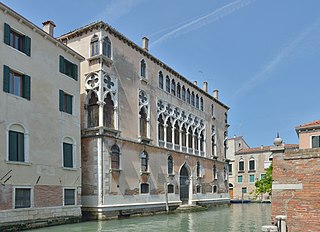
Palazzo Donà Giovannelli is a civil building located in the city of Venice, Italy in the Cannaregio district. The palace neighbors Palazzo Pasqualigo Giovannelli and overlooks the Rio di Noale and the Rio di Santa Fosca.
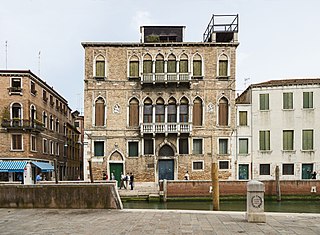
Palazzo Barbarigo Nani Mocenigo is a Gothic palace in Venice, Italy located in the Dorsoduro district, along the Nani embankment on the San Trovaso river, near the campo of the same name.



















